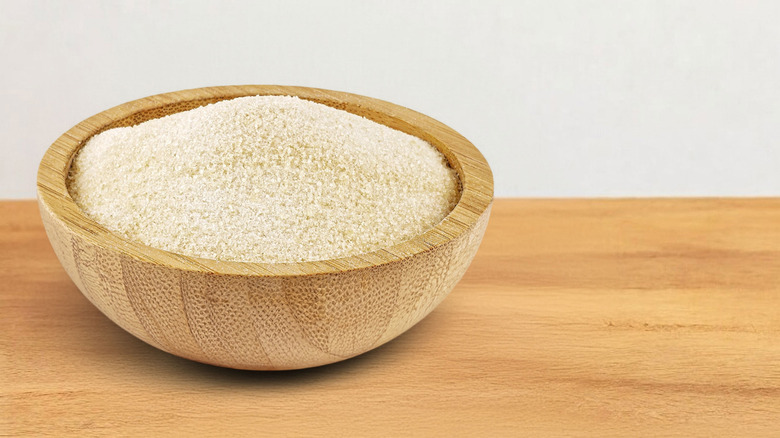11 Easy Ways To Upgrade Store-Bought Broth
Broth is a pantry must-have for at-home chefs who love to cook dishes with a lot of flavor. Whether you prefer chicken, beef, vegetable, or even fish broth, this delicious liquid will add flavor to dishes ranging from pasta and rice to savory sauces, soups, and stews. The uses are nearly endless, but it can be a pain to always have flavorful and delicious broth on hand — especially if you prefer to make it from scratch.
While store-bought broth is perfect for saving time and effort in the kitchen, it can sometimes be lacking on the flavor front. Luckily, there are a few fast and easy ways to add unexpected and intense flavors to your favorite off-the-shelf varieties. From quick fixes like adding gelatin to low-and-slow alternatives like reducing the stock, discover our top tips and tricks for upgrading your favorite store-bought broths to help make them feel freshly homemade.
Add fresh or dry herbs and spices
Store-bought broth usually has a good base flavor, but adding different herbs will help you customize it to your own taste. Your favorite fresh or dry herbs can give broth a more distinctive flavor that not only complements whatever recipe you're working on but will add depth and dimension that you can't achieve right out of the box.
There are no bad options when it comes to amping up boxed broth. Simmer earthy herbs like rosemary, thyme, and sage in the stock for a few hours to infuse it with woodsy flavors. You can also choose more potent alternatives like cilantro, dill, lemon balm, or mint to punch up your favorite store-bought broth. Once it's simmered, either use the stock right away or store it in the fridge for a few days and add it to everything from soup and stew to pasta and risotto.
Just like herbs, adding spices to your store-bought stock helps customize the flavors. Spicy add-ons like cloves and fennel will give the broth a warm, cozy feel. You can also tailor your flavor combinations depending on how you intend to use the broth — try cinnamon, anise, and cardamom for classic Vietnamese pho recipes or cayenne pepper, paprika, and garlic powder for gumbo.
Balance out richness with acidity
Most broth, whether store-bought and homemade, has a distinct rich flavor. Because it's usually made with a combination of bones, vegetables, and herbs, it has a savory, almost decadent taste. While this makes the perfect base for a plethora of dishes, it also can be a little one-note.
For more versatility and depth to your store-bought broth, add a hint of acidity to the mix. Acid is a vital element for any recipe, adding brightness and balance. While too much acid can make broth — or any dish — taste too sour, just a hint will help strike the perfect chord between the five flavor profiles: sweet, salt, sour, bitter, and umami. When doctoring up your store-bought broth, a touch of vinegar (white or apple cider will do), lemon juice, or white wine will help create a well-rounded result. You can also use this trick when making homemade broth.
Infuse flavor with meat
Although the main perk of purchasing store-bought broth is the ease and time-savings, sometimes you still want the rich flavor of homemade stock. To reach this happy medium, you can simmer protein in your store-bought stock for a few hours to add a more prominent, meaty flavor.
If you're using chicken broth, simmer chicken breast in the stock on low until it's cooked through. Not only does this add flavor to the stock, but it also gives you a delicious, moist piece of poached chicken you can use for salad, soup, or other favorites. The same logic applies with beef stock — take your favorite lean cut of beef and simmer it in the broth until cooked.
No matter which type of broth you're using, you can also toss in leftover bones to punch up the flavor even more. Just be sure not to use cuts that are too fatty or to leave the skin on — this can add a lot of unwanted fat and oil to your final product.
Add umami for more complexity
The more recent addition to the five basic tastes, umami flavor is often described as savory, brothy, or meaty. Associated with bold flavors like those in fish sauce, soy sauce, or oysters, umami can be hard to capture in certain dishes.
Unsurprisingly, many store-bought broths are lacking on the umami front. While they are often made with proteins like chicken or beef, this doesn't always translate well into an umami flavor in the broth — but don't worry. There are a fast and easy ways to add this missing element to your favorite brand of broth, including several pantry staples that can be strategically incorporated to round out the flavors. Tomato paste, dried mushrooms, or aged cheese rinds like Parmesan all are packed with umami. Toss one (or multiple!) of these ingredients into your broth and simmer to combine the flavors. Stronger, more distinct alternatives like miso paste or truffle oil will also do the trick.
Use garlic and onion to deliver tons of flavor
If you want a more neutral, versatile broth but still want to add some pizazz, consider simmering halved garlic heads in the broth until tender. The softened cloves will break up easily in the liquid, leaving a smooth and silky texture but infusing the final product with garlic's signature spicy, sweet flavor.
Onion is another way to add more flavor. This versatile vegetable can be quartered and thrown raw into a pot with your store-bought broth — you can even leave the skin on to add extra oomph. (You can also roast the onion first for a more caramelized, rich flavor.) Just keep in mind that darker onions, like red ones, may alter the color of the broth, whereas white or yellow onions shouldn't have any impact. Simmer on low and the broth will naturally pick up some of the onion's pungent notes.
Layer flavor with sauteed veggies
Many stocks are already made with the holy trinity of vegetables: carrots, onion, and celery. If you don't want to mess with a good thing, you can also add fresh versions of these beloved aromatics to your stock and simmer on low to boost the existing flavor. But for more depth of flavor, consider layering additional veggies into your store-bought stock.
Start by thinking of the final flavor you're aiming for. If it's milder, stick with subtle veggies like leeks, mushrooms, or root veggies like turnips. For intense, unexpected flavors, consider more potent ingredients like tomatoes, apples, pears, or seasonal ingredients like corn on the cob or bell peppers in the summer months.
If you're punching up the flavor of your store-bought stock, just be sure to label it clearly — stock infused with corn may not work well for every recipe (but it will be delicious in others!) so you want to be sure you're grabbing the right container.
Use gelatin for enhanced texture
Homemade stock usually has a thick, rich texture thanks to the gelatin that's naturally released when boiling chicken or beef bones. It can be hard to recreate that same luscious texture in store-bought alternatives, but luckily it's an easy fix. When using store-bought broth, sprinkle a small amount of powdered (not sheet) gelatin into your stock to start. Let it bloom for a few minutes before using it as you would for sauce, soup, or pasta.
The final result is a thick, glossy, and delicious stock that mimics the real deal (without all the time and effort it takes to make it from scratch). Gelatin is also flavorless and won't impact the taste of your overall dish. Just be sure not to add too much; about 2 teaspoons per cup of broth will give you the best texture. Any more than that can cause it to seize up and give you a lumpy, unappealing mess.
Cut through the richness with zesty elements
While a rich, meaty broth is always delicious, sometimes you need something with a little more zing. Strategically adding a few supplemental ingredients to your store-bought broth can quickly give you the flavor you're looking for.
Ginger is one of the best ways to infuse a delicious hint of spice. Add a few large pieces and simmer on low to infuse the broth with the heat and warmth of this tasty root. An added bonus? It's also perfect for the cold-weather months to soothe sore throats and help strengthen your immune system to combat colds and other ailments.
If you aren't a fan of ginger but want a similar effect, consider using other aromatics like lemongrass, cardamom, or even spicy peppers like jalapeños or serranos. These will all add that desired zest and kick when simmered down with store-bought chicken, veggie, or beef broth.
Adjust with salt
If you make one change to your store-bought stock, let it be adding the most important ingredient: salt. While most store-bought stocks already include salt (and sometimes, too-high levels of sodium), you can also buy low-sodium or sodium-free alternatives and adjust the salt levels yourself.
Salt is a universally beloved ingredient thanks to its ability to limit bitterness and amp up sweetness, sourness, and umami. This not only makes savory recipes delicious, but it also enhances sweet treats like cookies or brownies. Adding salt to store-bought broth helps save you from using a lot of salt when it comes time to cook. Just be cautious not to overdo it, as you can't turn back once the salt has been added (without watering down your stock and diluting the flavor). If you're looking for a hint of unexpected flavor, you can also experiment with flavored or smoked salts.
Simmer for more concentrated flavors
One of the most important ingredients for delicious homemade broth is time. And while store-bought alternatives are ready-to-go right off the shelves, taking some extra time to simmer the liquid and concentrate the flavors will give you that same artisan feel as a fresh batch of the homemade stuff.
Take your favorite brand of store-bought broth and reduce it on the stove, simmering until there is less liquid than you started with. This process reduces the volume of water in the broth — but leaves all of the flavor — giving you a more potent-tasting, thicker broth. Though it won't be as thick as if you added gelatin, reducing the broth will still help you reach a happy middle ground. You can also toss in your favorite vegetables, aromatics, and herbs to create a custom concoction that gives you the exact flavor and texture you need for your next recipe. Just be sure to watch the salt content, as reducing the broth not only intensifies the flavor but the sodium content, too.
Add extra bouillon cubes
Bouillon means "broth" in French (or more officially, "a liquid in which something has been boiled") — so it's no surprise that bouillon cubes are a fast and easy way to make broth at home. And while bouillon cubes are designed to be mixed with water to make broth, you can also add the pantry staple to store-bought broth for even more flavor. Another, similar option is Better Than Bouillon, a name brand paste that achieves the same result.
Because these pantry staples are made by concentrating all the same ingredients as the broth itself — like vegetables, aromatics, and salt — they can intensify store-bought broth without adding any unwanted or unexpected flavors. The best part? Bouillon cubes have a long shelf life of up to two years, so you can keep a plentiful supply on hand for when you need it. Choose from chicken, beef, or vegetable bouillon cubes depending on the broth you use most.











